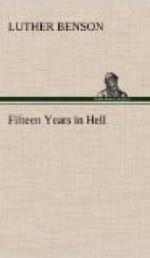Let us look at the rumseller, that we may know what manner of man he is, and then ask if he deserves the pity, sympathy, or respect of society, or any part of it. Viewed considerately, in the light of their respective motives, the drunkard is an innocent and honorable man in comparison with the retailer of drinks. The one yields under the impulse—it may be the torture—of appetite; the other is a cool, mercenary speculator, thriving on the frailties and vices of others. He is a man selling for gain what he knows to be worthless and pernicious; good for none, dangerous for all, and deadly to many. He has looked in the face the sure consequences of his course, and if he can but make gain of it, is prepared to corrupt the souls, embitter the lives, and blast the prosperity of an indefinite number of his fellow-creatures. By the selling of his poisons he sees that with terrible certainty, along with the havoc of health, lives, homes, and souls of men, he can succeed in setting afloat a certain vast amount of property, and that as it is thrown to the winds, some small share of it will float within his grasp. He knows that if men remain virtuous and thrifty, if these homes around him continue peaceful and joyous, his craft can not prosper. The injured old mothers, the wives, and the sisters are found where rum is sold. Orphan children throng from hut and hovel, and lift their childish hands in supplication, asking at the hands of the guilty whisky sellers for those who rocked their cradles, and fed and loved them. The murderer, now sober and crushed, lifts his manacled hands, red with blood, and charges his ruin upon the men who crazed his brain with rum. The felon comes from his prison tomb, the pauper from his dark retreat, where the rumseller has driven him to seek an evening’s rest and a pauper’s grave. From ten thousand graves the sheeted dead stalk forth, and with eyeless sockets and bared teeth, grin most ghastly scorn at their destroyers. The lost float up in shadowy forms, and wail in whispered despair. Angels turn weeping away, and God, upon his throne, looks in anger, and hurls a woe upon the hand which “putteth a bottle to his neighbor’s lips to make him drunken.” To balance all this fearful array of mischief and woe, flowing directly from his work, the dealer in ardent spirits can bring nothing but the plea that appetite has been gratified. There are profits, to be sure. Death finds it the most liberal purveyor for his horrid banquet, and hell from beneath it is moved with delight at the fast-coming profits of the trade; and the seller also gets gain. Death, hell, and the rumseller—beyond this partnership none are profited. Go and shake their bloody hands, you who will! The time will be when deep down in hell these miserable, blood-stained wretches will pant for one drop of water, and curse the day and hour that they ever sold one drop of liquor.




